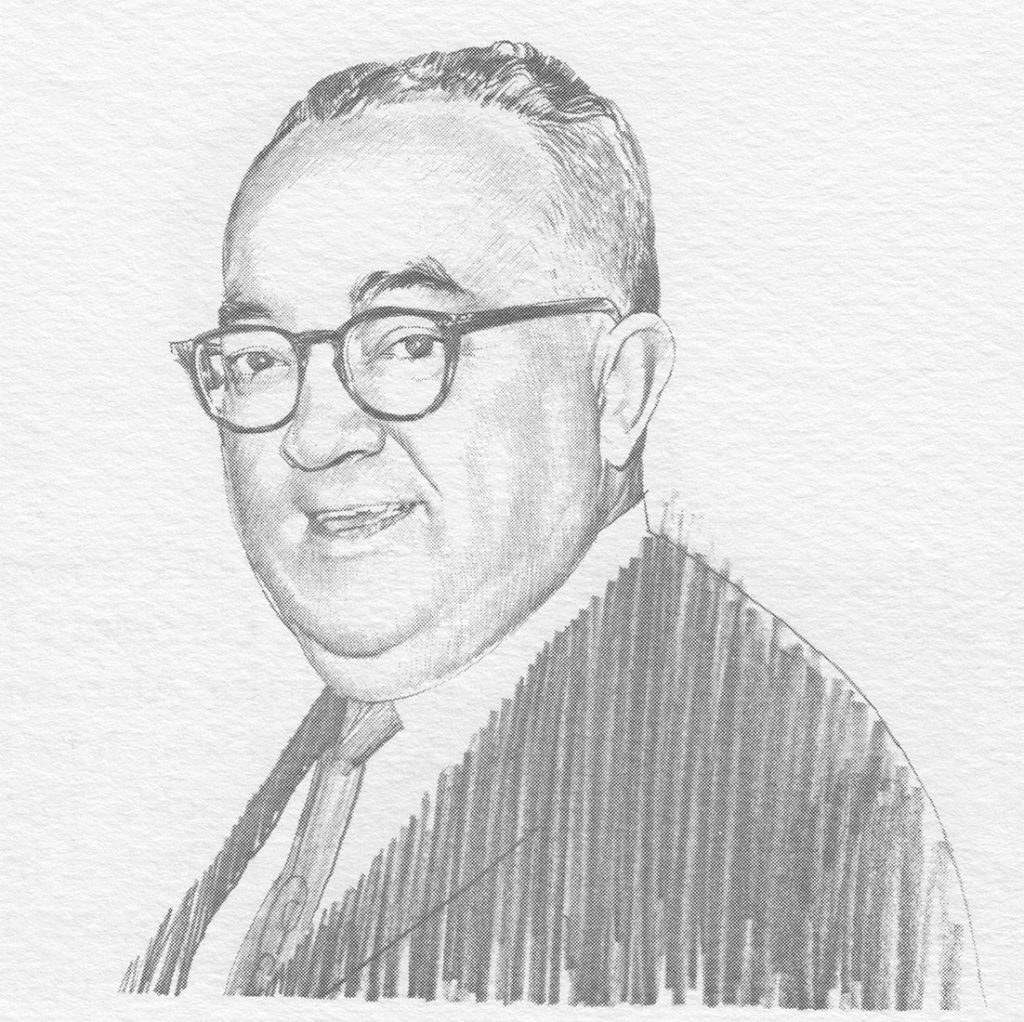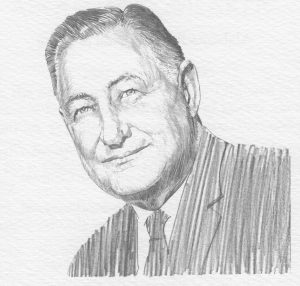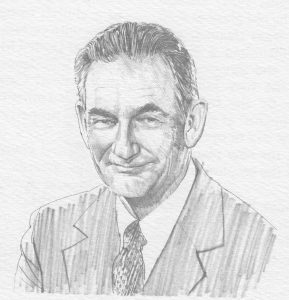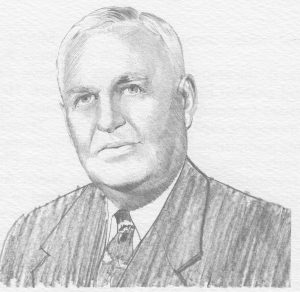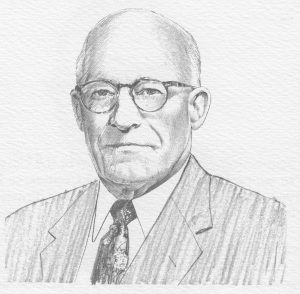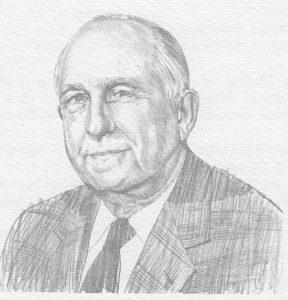Tine W. Davis told the 1978 graduating class at a Florida University that he recommended four “Be’s to Success” – “Be a dreamer … It’s fun; be a believer in yourself … It’s fun; be a planner . . . It’s fun; be a worker . . . It’s fun.”
Throughout his life, he followed this philosophy as he worked hard to help develop two-family grocery stores in Miami, Florida, into Winn-Dixie Stores, Inc.-a a network of over one thousand modern food centers in twelve states.
Tine W. Davis was born on January 8, 1914, in Gamaliel, Arkansas, to William Milton and Fannie Ethel (Chase) Davis. In that same year, the family moved to Burley, Idaho. There his father successfully operated a typical small-town department store (all merchandise, including groceries, sold on a “charge and deliver” basis) until another store opened on a “cash and carry” basis down the street. Young Tine’s father soon realized the new merchant had the “cash” while he had the “carry.”
Quick to see the advantages of the new merchandising technique, Mr. W. M. Davis moved with his wife, daughter (Vera), and four sons (A.D., James E., M. Austin, and Tine W.) to Miami, Florida. In 1925, he borrowed money to purchase a grocery store in Lemon City, a suburb of Miami. The entire family pitched in to make the store a success. A second store was opened. The family’s dogged persistence finally made it to success and brought about the birth of the Winn and Lovett supermarket chain.
After graduating from Miami Edison Senior High School in 1933, Tine Davis attended the University of Idaho for a year. When his father died in 1934, the young man returned to Florida where he attended the University of Florida for a year before beginning to work full-time in the family business. In 1936, he married D. Eunice Chandler of Ozark, Alabama. They became the parents of three children: Diane, Tiona (Toni), and Tine Wayne, Jr.
By 1940, Tine Davis had become a director of Winn and Lovett. His career was interrupted in 1942 when he was called to serve his country for three years as a Civilian Flight Instructor in the Army Air Corps. Mr. Davis always had a passion for flying and had earned his commercial pilot’s license in the 1930s.
After World War II, Mr. Davis again became a driving force in the grocery business. By 1950, he had moved from the Miami Division of Winn and Lovett to Louisville, Kentucky, where he became Division Manager. In 1954, he started work on the Montgomery, Alabama, Division, to centralize service of existing Winn and Lovett stores in Alabama and Florida and to acquire new stores to support a warehouse in Montgomery.
In 1955, when Winn and Lovett’s name was changed to Winn-Dixie, Mr. Davis was appointed Regional Director of the Louisville and Montgomery Divisions. He moved his family to Montgomery where a warehouse had been completed. During the following eight years, Mr. Davis directed the building or acquisition of eight or more stores per year to support the centralized warehouse. By 1963, the Montgomery Division was servicing 145 stores in a tri-state area.
Because of his pioneering efforts to expand markets, Mr. Davis was made Regional Director of the Montgomery, Louisville, and Louisiana Divisions of Winn-Dixie in 1963. In 1968, he became Director of the new Atlanta Division. He directed the four divisions until 1970 when he removed the Atlanta Division from his direct leadership to cut down on his traveling time.
With Winn-Dixie’s first entrance into the Western market in 1976, Mr. Davis’ expertise was again called upon. He was assigned the responsibilities of Regional Director of the newly acquired stores in Fort Worth, Texas, and surrounding areas. Because of these added responsibilities, by 1979 Mr. Davis relinquished direct supervision of both the Atlanta and the Louisville Divisions, but still considered them a part of his responsibility. Mr. Davis was a man who believed that “the only limitations that will ultimately hold you back in life will be those you place on yourself.”
Throughout his life, like most men of great achievement, he devoted much of his spare time to worthy causes. He was a founder and then a member of the board of trustees of the Alabama Sheriffs’ Boys’ and Girls’ Ranches. Because of his extensive fund-raising efforts for these homes for orphaned children, Mr. Davis earned the nickname, “Mr. Boys’ Ranch.”
He also played an active role in championing support for educational institutions in Alabama and Florida. He served as a member of the University of Alabama’s College of Commerce Board of Visitors and of. the Board of Trustees of Troy State University. He was a former General Chairman of the Capital Fund Raising Program for Marion Institute. Mr. Davis was also a director on the boards of at least six companies in Alabama and Florida, and a loyal member of the First Presbyterian Church in Montgomery.
In recognition of his business acumen and humanitarian efforts, the Alabama legislature passed a Joint Resolution in 1976. Mr. Davis was awarded four honorary degrees: a Doctorate of Laws by Troy State University; a Doctorate of Aviation Management by Embry-Riddle Aeronautical University, Daytona Beach, Florida; a Doctorate of Humane Letters by Bethune Cookman College, Daytona Beach, Florida; and a Doctorate of Humanities by Rust College, Holly Springs, Mississippi. He received honorary life memberships in the Florida Sheriffs’ Association and the Kiwanis Club of Louisville, Kentucky. He was the recipient of the Alabama Farm Bureau Federation’s Agricultural Award and the Champion of Independent Education in Florida Award. He was awarded the “Significant Sig Medal” by his fraternity at the University of Idaho.
Tine Davis died on August 6, 1980. His influence will be felt in the nation for many years to come. He will be remembered as the man with the jovial disposition and hearty laugh who was instrumental in developing a national supermarket chain and in improving the quality of the lives of those in the states where he worked.

